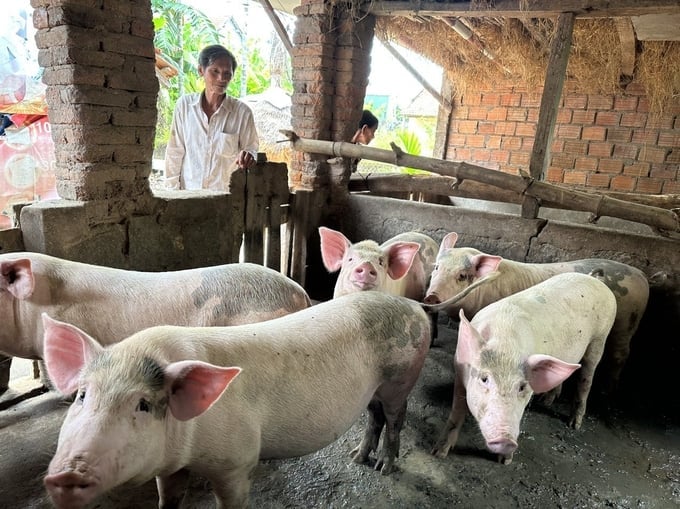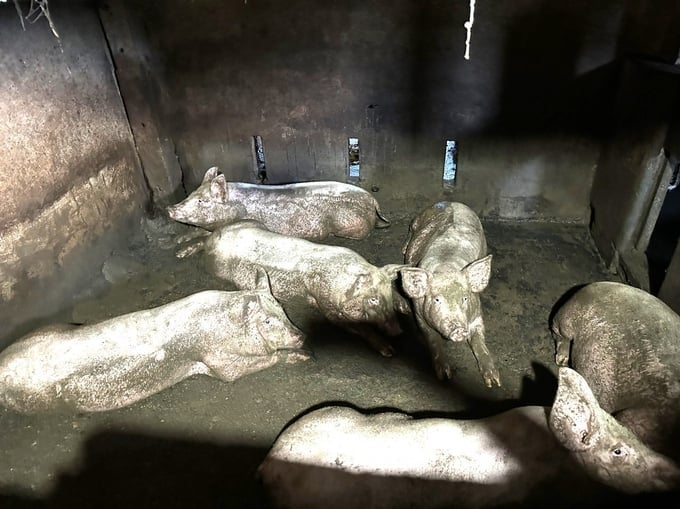May 20, 2025 | 19:50 GMT +7
May 20, 2025 | 19:50 GMT +7
Hotline: 0913.378.918
May 20, 2025 | 19:50 GMT +7
Hotline: 0913.378.918

For small-scale livestock farmers, the majority of their breeding stock is purchased locally from other households. As a result, the vaccination and disease prevention measures for these animals can vary significantly among families. Photo: L.K.
Regarding disease control activities in smallholder livestock farming, the majority of animal health officers at grassroots level in Quang Ngai province acknowledges the immense difficulty of this undertaking. There are several contributing factors, with the fundamental reason being the unreliable and uncertified source of livestock breeds. Most notably, many smallholder farmers acquire their livestock breeds from individual, small-scale sources. Accordingly, piglets are made available for sale without undergoing vaccination or inspection when they reach the requisite age and size.
After an extended period of livestock production suspension due to disease outbreaks, Mr. Nguyen Van Tho's family, residing in Tay village, Tinh Son commune, Son Tinh district, Quang Ngai province, purchased eight piglets from local residents for rearing purposes at the outset of this year. Mr. Tho asserts that procuring livestock externally proves to be notably more economical. Accordingly, the average price of his piglet currently stands at approximately 500,000 VND. Conversely, piglets purchased from large-scale farms or livestock companies can exceed 1 million VND per head.
Fearing the resurgence of diseases, Mr. Tho promptly summoned animal health officers to administer vaccinations against classical swine fever and E. coli infections upon acquiring the piglets and releasing them into their pens. "In addition, I routinely engage in pen sanitation and scatter lime powder around the rearing pens. So far, the pig herd is showing relatively positive growth. Livestock breeders within family settings like ours primarily often resort to preventive measures of such magnitude. Should an outbreak occur, we must eventually bear the consequences," shared Mr. Tho.
Following issues regarding breeding sources, the current vaccination rate for livestock is also a notable concern among smallholder livestock farmers. According to Ms. Nguyen Thi Thuy Trang, an officer specializing in Livestock Production and Animal Health in Tinh Son commune, local households raising at least ten pigs tend to place significant emphasis on disease prevention measures. Conversely, households engaged in smaller-scale livestock farming rarely prioritize these measures, often perceiving livestock production as a straightforward practice primarily involving the utilization of surplus food or agricultural by-products.

Many livestock farmers have failed to pay adequate attention to disease prevention and maintaining hygiene in their livestock living areas. Image: L.K.
"The majority of local households are relatively indifferent towards diseases among their livestock herds. When free mass vaccinations are offered, farmers eager to participate. However, they are less enthusiastic if vaccination comes at a cost. Some animal health officers find it difficult to provide advice and assistance because farmers suspect them of offering vaccination services for profit. In such cases, the local government often have to intervene to encourage compliance. Additionally, the rising costs of livestock production and the fluctuating market prices for pigs caused livestock farmers to limit vaccinations to save costs," Ms. Trang explained.
Mr. Nguyen Anh Tuan, an Agricultural Extension and Animal Health in Nghia Thang commune, Tu Nghia district, Quang Ngai province, further emphasized that, in addition to the aforementioned factors, another prevalent issue arises when pigs in the province contract diseases. In such cases, local farmers refrain from immediately reporting these discoveries to the relevant authorities, and rely on independent veterinary practitioners for treatment instead. If the treatment fails to yield favorable outcomes within a specific timeframe, driven by concerns over financial losses, these farmers will sell all of the infected pigs to various locations in an attempt to salvage a portion of their investment.
"For example, four households in An Tay hamlet discovered that 20 of their pigs were infected on August 9. However, we only received information on the evening of August 16, and we visited the site on the morning of September 17 for inspection and sampling. By that time, 19 pigs had already died. The considerable time lapse between when the pigs were infected and when the local authorities were alerted allowed the disease to thrive. Without effective management, this delay will continue to facilitate the rapid spread of diseases," Mr. Tuan warned.
Mr. Tuan also stressed that, apart from the awareness of local residents, independent veterinary practitioners must bear a share of responsibility. These individuals are often hired by livestock farmers to vaccinate or treat their animals during disease outbreaks. Consequently, these independent veterinary practitioners legally binding arrangements with the local authorities.
Most notably, some practitioners intentionally conceal their limited professional expertise. As a result, they often encourage livestock farmers to sell or transport all of the infected animals when treatment proves ineffective. This complicates the task for local officials by making disease management challenging as well as exacerbating disease outbreaks.
Translated by Nguyen Hai Long

(VAN) Japan's grant aid project contributes to capacity building, promoting organic agricultural production, and fostering sustainable community development in Dong Thap province.

(VAN) For years, the CRISPR-Cas9 genome technology has been reshaping genetic engineering, a precision tool to transform everything from agriculture to medicine.

(VAN) Vietnam aims to become a 'leader' in the region in the capacity and managing effectively soil health and crop nutrition.
![Reducing emissions from rice fields: [Part 1] Farming clean rice together](https://t.ex-cdn.com/nongnghiepmoitruong.vn/608w/files/news/2025/05/05/z6509661417740_a647202949c539012a959e841c03e1d3-nongnghiep-143611.jpg)
(VAN) Growing clean rice helps reduce environmental pollution while increasing income, allowing farmers to feel secure in production and remain committed to their fields for the long term.
/2025/05/19/5136-1-144800_230.jpg)
(VAN) The Nghe An Provincial People's Committee has just approved the list of beneficiaries eligible for revenue from the Emission Reductions Payment Agreement (ERPA) in the North Central region for the year 2025.

(VAN) 14 out of 35 domesticated elephants in Dak Lak province have had their living conditions improved, with 11 of them currently participating in the non-riding elephant tourism model.

(VAN) Muong Nhe Nature Reserve hopes that being upgraded to a national park will lay the foundation for forest protection efforts to be carried out in a systematic, modern, and sustainable manner.